仁爱版八年级英语上册Unit3Topic1知识汇总
Unit3 topic1-3重要知识点讲解2021-2022学年仁爱版八年级英语上册

Unit 3 Our hobbies重要知识点讲解Topic 1一、used toI used to collect baseball cards.我过去常常收集棒球卡片。
[点拨]"used to+do"意为“过去常常做某事”二、询问对方的爱好的句型-What's your hobby?你的爱好是什么?-I like listening to music.我喜欢听音乐。
[点拨]"What's your hobby?"用于询问对方的爱好。
回答形式:I like/love V-ing.Topic 2一、感叹句-What sweet music!多么优美的音乐!-What a pity!好可惜![点拨]"感叹句"指表达欢喜、悲伤、惊讶等感情的句子。
一般以疑问词what或how起始,而以惊叹号终结。
How与What引导的区别在于,How用于感叹形容词,而What则感叹名词。
感叹句通常有以下形式:1.What a(an)+形容词+名词+S+V…!What lovely flowers they are!好美的花朵啊!2.How+形容词(或副词)+S+V…!How beautifully you sing!你唱得真美妙!3.How+形容词+ a[an]+名词+S+V… !How kind a man he is! 他这个人真好!上述结构中的主谓可以省略。
如:How lucky (I am) !我是多么地幸运啊!Topic 3一、过去进行时I was taking a shower at this time yesterday.昨天这个时候我正在洗澡。
[点拨]"Be(was、were)+doing"是过去进行时的表达式。
过去进行时表示在过去某一时刻或某一段时间内进行或发生的动作。
常与表示过去的时间状语连用,如:last night, last Saturday等;或者与when, while, as引导的过去时间状语连用。
【知识点】仁爱版英语8年级上册Unit3 Topic1
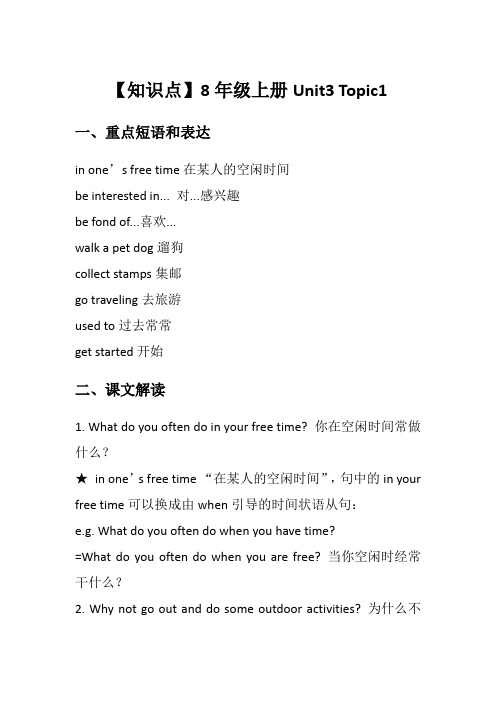
【知识点】8年级上册Unit3 Topic1一、重点短语和表达in one’s free time在某人的空闲时间be interested in... 对...感兴趣be fond of...喜欢...walk a pet dog遛狗collect stamps集邮go traveling去旅游used to过去常常get started开始二、课文解读1. What do you often do in your free time? 你在空闲时间常做什么?★in one’s free time “在某人的空闲时间”,句中的in your free time可以换成由when引导的时间状语从句:e.g. What do you often do when you have time?=What do you often do when you are free? 当你空闲时经常干什么?2. Why not go out and do some outdoor activities? 为什么不做一些户外运动?★why not “为什么不…”,相当于why don’t you,后接动词原形。
★do outdoor activities 做户外运动do indoor activities 做室内运动3. Maybe I need a change. 或许我需要改变一下。
★maybe和may be都表示“也许,或许”的意思,区别如下:①maybe是副词,只能作句子中的状语。
e.g. Maybe he is a student. 或许他是个学生。
e.g. ---Is he 6 years old? 他6岁了吗?---Maybe. 也许吧。
②may be则是两个词,应该分开来看。
may是情态动词,本身不能算作谓语动词,即不能作句子的谓语,使用时必须后接谓语动词;而be则是系动词,可以作谓语。
e.g. He may be a student. 或许他是个学生。
Unit 3 Topic 1知识梳理仁爱版英语八年级上册

Unit 3 Topic 1 知识梳理一.重点单词二.词组Section A1. in one ’s free time=in one ’s spare time在某人的业余时间 2. recite poems朗诵/背诵诗歌 3. love doing sth/ to do sth热爱做某事 4. do some outdoor activities做一些户外活动 5. Sounds good!听起来很好! 6. need a change需要改变一下 7. be interested in sth/doing sth对某事/做某事感兴趣 8. be fond of sth/doing sth.=like/love/enjoy/ prefer+doing sth.喜欢某事、做某事 9. walk a pet dog遛狗 10. go fishing/traveling/swimming去钓鱼/旅行/游泳 11. collect stamps集邮 12. stamps collections邮票收藏品 13. plant flowers种花 14. climb mountains爬高山 Section B1. used to do sth过去常常做某事 2. learn...from...从……学到…… 3. play computer games 玩电脑游戏 hobby (n.)——hobbies (pl.)cut(v.)——cut (过去式)——cutting(现在分词) poem(n.诗) ——poet(n.诗人)stick(v.)——stuck (过去式)——sticking(现在分词) △collect(v.)——collection(n.)△introduction(n.)——introduce(v.) hate(v.) ——like/love/enjoy(反义词)owner(n.)——own (v./adj.) friend(n.)——friendship(n.)——friendly(adj.)——unfriendly(adj.)everyday(adj.)——every day(adv.) funny(adj.滑稽的) ——fun(adj.开心的;令人愉快的)comfort(n./v.)——comfortable(adj.)Section C1.more than=over 超过……以上2.△keep pictures 保存图片3.△other things they want to remember 其他他们想要记住的东西4.△funny collections 好笑的收藏,滑稽的收藏5.the world’s most stupid ideas 世界上最愚蠢的想法6.the world’s most ugly dogs 世界上最丑陋的狗7.△get started 开始8.start with 以……开始9.cut out 剪出10.need sth. to do sth. 需要某物做某事11.stick sth. to... 把某物粘贴在……上12.It’s fun to do sth. 做某事有乐趣13.△make a scrapbook 制作一本剪贴本14.share sth. with sb. 与某人分享某物Section D1.everyday pets 日常宠物2.provide sb. with sth. 提供某人某物3.=provide sth. for sb. 为某人提供某物4.△keep him in the house 把他养在房子里5.keep pets 养宠物6.take a bath=have a bath 洗澡7.in the pond 在池塘中8.whether...or not 是否……9.take sb. out for a walk 带某人出去散步10.be special to sb. 对某人很特别三.重点句子1. And I also enjoy reading stories and listening to music.我也很享受读故事和听音乐2. Why not go out and do some outdoor activities?为什么不出去做一些户外活动呢?3. Maybe I need a change.可能我需要一个改变。
精编仁爱英语八年级上册Unit3 Topic1知识点和练习(有答案)

精编仁爱英语八年级上册Unit3 Topic1知识点和练习(有答案)G8 Unit 3: Our HobbiesTopic 1: What's Your Hobby?1.What do you usually do in your free time?In one's free time。
one can XXX.2.I love reciting XXX.One can express their hobbies using verbs such as enjoy。
like。
love。
be fond of。
or be interested in。
followed by a noun。
pronoun。
or gerund.3.Why not try some outdoor activities?One XXX。
indoor activities XXX.4.Maybe I need a change.Maybe is an adverb that means "perhaps" or "possibly." May be is a verb phrase that means "might be" or "could be."5.XXX.To walk a pet dog means to take it for a walk on a leash.6.It's great fun.XXX。
One can have fun doing something that they enjoy。
XXX.XXX: What are your hobbies?Wen Wei: Well。
what's your hobby?XXX: I love dancing and I'm also a movie fan。
新仁爱版英语八年级上册unit3重点短语和句子

新仁爱版英语⼋年级上册unit3重点短语和句⼦新仁爱版英语⼋年级上册unit3重点短语和句⼦Unit 3 Topic 1 总结学案⼀、重点词组1 .like / love / enjoy doing sth.喜欢做某事be interested in doing对做某事感兴趣be fond of doing sth喜欢做某事prefer doing sth.更喜欢做某事2.hate doing sth. 讨厌⼲…3.go fishing/ go traveling/go swimming 去钓鱼 /去旅⾏/ 去游泳4.listen to music 听⾳乐5. go out (for a walk )出去(散步)6. do some outdoor activities进⾏户外运动7. play computer games 玩电脑游戏8.watch movies 看电影9.walk a pet dog/keep pets遛狗 /饲养宠物10. collect stamps 收集邮票11.climb mountains 爬⼭12.fly kites 放风筝13.model planes 飞机模型14.keep pets 养宠物15. start /begin with …以……开始16. share sth with sb 与某⼈分享17.provide sb with sth /provide sth for sb 为某⼈提供某物Eg.Our school provides us with free Lunch.18. in one’s life /lives在某⼈的⼀⽣中19. cut out 剪下20.more than =over 超过 /多于21.take a bath 淋浴22.take sb/sth out for a walk带某⼈/某物出去散步23.be special to sb对某⼈来说是特殊的24. go to the movie theater去电影院25.in one’s free time在某⼈的业余时间26.dance to music 伴着⾳乐跳舞27. Not all 并⾮所有28.call sb. sth. 把某某称之为….29. just like 就像…30.learn…from 从…学到31. learn /know about 了解32. talk about 谈论33.sounds good 听起来很好34.stick ...to ...粘贴到…/doc/5115011201.htmled to do sth . 过去常常⼲…否定: didn’t use to do sth. ⼀般疑问句:Did sb use to do sth ?①.I used to collect stamps, but now I hate it.②. He didn’t use to play computer games , but now he likes it.③. What hobby did you use to have?=Our school provides free lunch for us.⼆、重点句⼦1.What do you do in your free time ?在空闲时间⾥你做什么?2.What’s your habby?你的爱好是什么?3.Why not go out and do some outdoor activities?为什么不出去做户外活动?4.Kangkang is fond of swimming 康康喜欢游泳5.I used to enjoy pop music ,but now I don’t like it。
最新仁爱版英语八年级上册Unit3 Topic1知识点 完整版
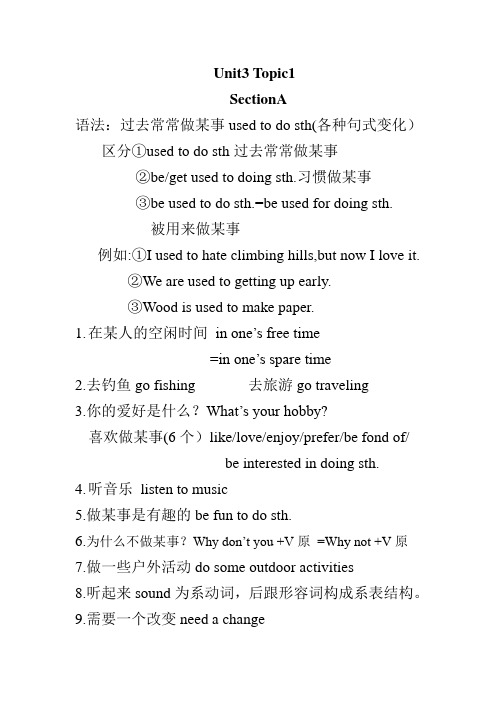
Unit3 Topic1SectionA语法:过去常常做某事used to do sth(各种句式变化)区分①used to do sth过去常常做某事②be/get used to doing sth.习惯做某事③be used to do sth.=be used for doing sth.被用来做某事例如:①I used to hate climbing hills,but now I love it.②We are used to getting up early.③Wood is used to make paper.1.在某人的空闲时间in one’s free time=in one’s spare time2.去钓鱼go fishing 去旅游go traveling3.你的爱好是什么?What’s your hobby?喜欢做某事(6个)like/love/enjoy/prefer/be fond of/be interested in doing sth.4.听音乐listen to music5.做某事是有趣的be fun to do sth.6.为什么不做某事?Why don’t you +V原=Why not +V原7.做一些户外活动do some outdoor activities8.听起来sound为系动词,后跟形容词构成系表结构。
9.需要一个改变need a change10.随着音乐跳舞dance to music11.遛狗walk a pet dog12.集邮collect stamps13.种花plant flowers 浇花water flowers14.爬山climb mountainsUnit3 Topic1 SectionB1.集邮collect stamps 邮票集stamp collection2.想要做某事would like to do sth.=want to do sth.=feel like doing sth.3.感叹句what+名词①What beautiful stamps!②What fine weather!③What a nice girl!4.许多a lot of=lots of后跟可数名词复数或不可数名词5.三种推测①肯定推测must be(必定是)②可能性推测may be(可能是)③否定推测can't be(不可能是)6.向…学习learn…from学习做某事learn to do sth.7.你过去常常有什么爱好?What hobbies did you use to have?I used to collect baseball cards.过去常常做某事used to do sth.I used to go fishing.(否定句)I didn’t use to go fishing.(一般疑问句)Did you use to go fishing?Yes,I did/No,I didn,t.8.康康来了。
初中英语 仁爱版八年级上Unit3 Topic 1重点短语句子
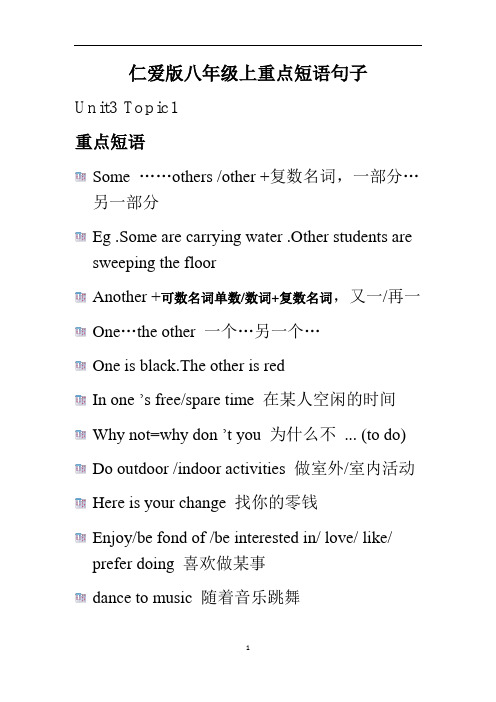
仁爱版八年级上重点短语句子Unit3 Topic1重点短语Some ……others /other +复数名词,一部分…另一部分Eg .Some are carrying water .Other students are sweeping the floorAnother +可数名词单数/数词+复数名词,又一/再一One…the other 一个…另一个…One is black.The other is redIn one ’s free/spare time 在某人空闲的时间Why not=why don ’t you 为什么不... (to do)Do outdoor /indoor activities 做室外/室内活动Here is your change 找你的零钱Enjoy/be fond of /be interested in/ love/ like/ prefer doing 喜欢做某事dance to music 随着音乐跳舞Walk a pet dog 遛狗May be 可能是; can be可以是;must be 应该是Learn...from... 从...学习...;learn from...从中学习…Get started 着手开始Start/begin with... 以...开始Cut out 剪下Stick...to... 把...粘贴在...Share sth to sb. 与...分享...Used to do 过去常常做某事;get/be used to doing 习惯于做某事Be used to do sth 被用来做某事It is fun to do/doing 做是很有趣的Keep warm 保暖Provide sb. with sth=provide sth. for sb. 为某人提供某物。
Whether...or not... 是否...(固定词组) Take sb. out for a walk 带某人出去散步Be special to 对...特别There used to be 某地过去曾有某物Decide to do 决定做某事In one ’s life 在某人的生命里Just...like 就像...一样Keep one ’s mind on doing 专心的做某事重点句子/交际用语1.W hat do you often do in your free time?你在业余时间经常做什么?2.It's great fun.这很有趣。
仁爱版英语八年级上册u3t1知识点

仁爱版英语八年级上册u3t1知识点本文将为大家介绍仁爱版英语八年级上册 Unit 3 Topic 1 的知识点。
该部分内容主要涉及基本单词、词组、句子及语法知识。
下文将分别进行介绍。
一、基本单词1. 动词:1)inflict:v. 使遭受痛苦,使受惩罚2)limit:v. 限制,约束,限定2. 名词1)struggle:n. 奋斗,斗争,努力2)limitation:n. 限制,局限性3. 形容词1)fierce:adj. 凶猛的,猛烈的,狂热的2)pathetic:adj. 可怜的,悲哀的,引起怜悯的二、词组1. inflict punishment on sb.:对某人施加惩罚2. limit sb./sth. to sth.:将某人/某事物限制在某种程度上3. struggle for sth.:为某事物而奋斗4. pathetic sight:可怜的景象5. in fierce competition:在激烈竞争中三、句子1. The cruel dictator inflicted severe punishment on those who opposed him.2. The teacher limited the number of words the students could usein their essays to 500.3. Many people struggle for their dreams all their lives.4. The beggar on the street was a pathetic sight to behold.5. The two companies were in fierce competition for the market share.四、语法知识1. To 形式的不定式在英语中,to 形式的不定式可以当作名词、形容词或副词使用。
仁爱版英语八年级上册八上Unit 3 Topic 1 必背词句

八上Unit 3 Topic 1 必背词句一、单词1.业余爱好者hobby 2背诵recite 3. 诗;韵文poem 4.也许maybe 5收集collect6.喜爱的fond7.宠物;宝贝pet8.种植plant9.收藏品collection 10.玩偶,玩具娃娃doll 11.硬币coin 12.厌恶;仇恨hate 13.大众的,通俗的pop 14.剪贴簿scrapbook 15.友谊friendship 16.滑稽的funny 17.愚蠢的stupid 18.丑陋的ugly 19.背景background 20.纸张paper 21.剪刀scissors 22.胶水glue 23.剪cut24.粘贴stick 25.懒惰的lazy 26.题目title 27.章节passage28.介绍introduction 29.日常的everyday 30.蛇snake 31.提供provide 32.主人owner 33.安慰comfort 34.猪,贪婪的人pig 35.洗澡;浴室;浴盆bath36.池塘pond 37.肮脏的dirty 38.不友好的unfriendly二、短语(字体加粗且加下划线内容为课后单词表中的短语)1.对…感兴趣be interested in2.喜欢be fond of3.在你空闲的时候_in your free time4.背诵诗_recite poems5.一个影迷a movie fan6.去遛狗walk a pet dog_7.种花_plant flowers 8.邮集stamp collection 9.饲养宠物keep pets10.开始get started 11.洗澡take a bath三、句子(字体加粗且打*内容为Section D 语法和功能句)1.P55 你在空闲时间里经常做什么? 我经常去钓鱼。
What do you often do in your free time? I often go fishing2.p55她喜欢看故事书和听音乐。
八年级上册英语unit3topic1知识点

八年级上册英语unit3topic1知识点在八年级上册英语学习中,Unit 3 Topic 1是一个重要的知识点。
该知识点包括以下内容:一、词汇1.单词:umbrella,drizzle,pour,clap,mist,fan,gloomy,humid,flood,drought,shelter,evaporate等。
2.短语:outdoor activities,weather forecast,rainy day,sunny day,humid day,flood season,drought season等。
二、语法1.一般现在时的用法和句型结构。
2.情态动词can的用法和与现在能力和过去曾经做过某事的区别。
3.行动动词和非行动动词的区别。
三、听力1.听力技巧:重点抓关键词,注意细节,以及练习听不完整的句子。
2.听力练习:听天气预报,听简短对话等。
四、口语1.句型练习:问天气,谈论天气,以及描述不同天气的感受。
2.语音练习:重读和语调的应用。
五、阅读1.阅读技巧:整体理解,寻找主旨,注意细节,以及理解文化差异。
2.阅读练习:读天气短文,读简单对话,以及阅读文化类材料。
六、写作1.写作技巧:列提纲,分类写作,表达观点,注意语法和拼写。
2.写作练习:写天气短文,写介绍某个季节的文章,以及写建议性文章。
以上就是八年级上册英语Unit 3 Topic 1的知识点内容。
同学们学习时,应该注重掌握词汇、语法、听力、口语、阅读和写作等方面,并进行适当的练习和复习,以便更好地理解和应用这些知识点,从而提高自己的英语水平。
Unit3Topic1知识点总结仁爱版英语八年级上册

U3Topic1总结单词hobby(hobbies)兴趣爱好recite背诵poem诗歌theater剧院rent租借change改变maybe 也许collect收集stamps邮票plant种植carry携带(carries-carried) coin硬币scrapbook剪贴簿friendship友谊stupid愚蠢的ugly丑陋的decide决定background背景scissors剪刀glue胶水stick粘贴(stuck) lazy懒惰的share分享introduction介绍dangerous危险的snake蛇provide提供owner主人comfort安慰pond池塘special特别pet宠物hate讨厌funny滑稽的dirty肮脏的unfriendly不友好的词性变化own v.拥有-owner n.主人introduce v.介绍-introduc tion n. collect v.收集-collect ion n.收藏品interest n.兴趣-interest ing有趣的(物)-interest ed感兴趣(人)fun n.乐趣-fun ny adj.滑稽的friend n.朋友-friend ly adj.友好的-un friend ly adj.不友好的-friend ship n.友谊短语enjoy/like/love doing 喜欢做某事hate doing讨厌做某事prefer to do/doing 更喜欢做某事have fun doing开心做某事mind doing介意做某事practice doing练习做某事finish doing完成做某事feel like doing 想要做某事be busy doing 忙于做某事read stories读故事recite poems背诵诗歌collect stamps集邮go traveling 去旅游plant flowers种花walk a pet dog遛狗keep pets养宠物listen to pop music听流行音乐collect coins收集硬币photos of famous stars明星照片make a scrapbook做剪贴簿watch DVDs at home在家看碟片go to the movie theater去影剧院stick...to粘贴share sth with sb和某人分享某物cut out pictures剪出图片start with=begin with以…为开始be interested in对……感兴趣be fond of 喜欢provide sb with sth给某人提供某物used to do 过去常常做某事be used to doing习惯做某事do outdoor activities做户外活动take sb out for a walk带某人出去散步be special to sb对某人特别decide to do 决定做某事make a self-introduction做自我介绍句型1.【询问兴趣爱好】What’s your hobby?你的兴趣爱好是什么?2.【询问空闲时间做什么】What do you often do in your free time?你空闲时间经常做什么?3.【used to do 过去常常做某事】I used to enjoy pop music, but now I am fond of playing sports. 我过去喜欢流行乐,但是现在我喜欢做运动。
仁爱版英语八年级上册Unit3__Topic1__课文重难点讲解

Unit3 Topic1 课文重难点讲解【1】Maybe I need a change.也许我需要改变一下。
(1) maybe1) adv. 意为“也许,或许,大概”,用来表示推测,在句中作状语,含义与perhaps 相同。
如:— Will they come? 他们会来吗?— Maybe. 也许。
Maybe he will be a little late. 或许他会迟到一会儿。
2) maybe不同于may be。
may be是情态动词,may+系动词be,意为“或许(是)”,作谓语,表示可能性。
其后可用形容词、名词、代词或介词短语等作表语。
如:It may be true. 那或许是真的。
He may be a little late.他或许会迟到一会儿。
(2) change1) 名词,这里有“换口味”的含义。
如:Let's go to a movie tonight for a change!我们今晚换换活动,去看电影吧!2) change作名词,还有“零钱,找零”的意思。
如:Here is your change. 这是找你的零钱。
3) change作动词时,意为“改变,变化”。
如:The town has changed from a small fishing port to a bustling tourist center. 这个小镇从一个小渔港变成了热闹的旅游中心。
【2】I am interested in playing basketball. 我对篮球运动感兴趣。
interested adj.意为“感兴趣的”,常用于be interested in这一结构中,表示“对……感兴趣”。
如:She is interested in music.她对音乐感兴趣。
【链接】interest与interesting(1) interest n.1)兴趣,趣味,关心,作不可数名词。
仁爱英语八年级上册Unit3-topic1知识点总结

Unit3 Our HobbiesTopic1 What is your hobby?一、重点短语such as 例如used to do sth. 过去常常做某事take a bath 洗澡be interested in 对……感兴趣go dancing 去跳舞go boating 去划船play volleyball 打排球collecting stamps 集邮collecting coins 收藏硬listening to pop music 听流行音乐listening to classical music 听古典音乐listening to symphony 听交响乐walking in the countryside 在乡间散步二、重点句型1. Wow! So many stamps! 哇,那么多的邮票!2. We can learn a lot about people, places, history, and special times from stamps. 通过这些邮票我们可以学到许多关于人文、地理、历史和特殊时代的知识。
3. Would you like to collect any of these things? 你想集下面这些东西吗?4. What things do you love collecting? 你喜欢集什么东西?5. I am interested in playing sports. 我对运动感兴趣。
6. What do you often do in your spare time? 在你的业余时间里面你都做些什么啊?7. I often go fishing. 我经常去钓鱼。
8. And I do a lot of reading. 我通常都是阅读一些书籍。
9. I' m a movie fan. 我是一个电影迷。
10.I also rent VCDs and watch them at home. 我也租一些VCD 在家看。
仁爱版八年级上册英语1--4单元知识点总结
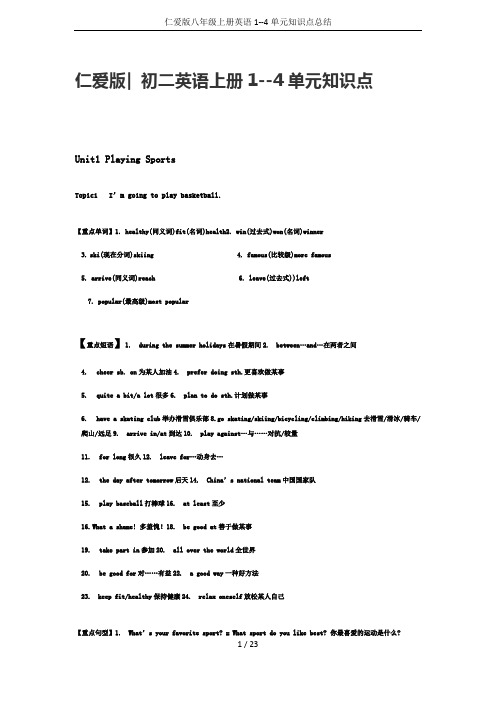
仁爱版| 初二英语上册1--4单元知识点Unit1 Playing SportsTopic1 I’m going to play basketball.【重点单词】1. healthy(同义词)fit(名词)health2. win(过去式)won(名词)winner3.ski(现在分词)skiing4. famous(比较级)more famous5. arrive(同义词)reach6. leave(过去式))left7. popular(最高级)most popular【重点短语】1. during the summer holidays在暑假期间2. between…and…在两者之间4.cheer sb. on为某人加油4. prefer doing sth.更喜欢做某事5.quite a bit/a lot很多6. plan to do sth.计划做某事6.have a skating club举办滑雪俱乐部8.go skating/skiing/bicycling/climbing/hiking去滑雪/滑冰/骑车/爬山/远足9. arrive in/at到达10. play against…与……对抗/较量11.for long很久12. leave for…动身去…12.the day after tomorrow后天14. China’s national team中国国家队15.play baseball打棒球16. at least至少16.What a shame! 多羞愧!18. be good at善于做某事19.take part in参加20. all over the world全世界20.be good for对……有益22. a good way一种好方法23. keep fit/healthy保持健康24. relax oneself放松某人自己【重点句型】1. What’s your favorite sport? = What sport do you like best? 你最喜爱的运动是什么?2.Which sport do you prefer? = Which sport do you like better?你更喜欢什么运动?I prefer skating. = I like skating better. 我更喜欢滑雪.3.Do you skate much? = Do you often skate? 你常滑雪吗?4.She spends at least half an hour in the gym every day. 每天她至少花半小时在体育馆.5.She plays baseball pretty well and she is also good at jumping. 她棒球打得相当好而且擅长于跳.6. What kind of sports do you like? = Which sport do you like? 你喜欢哪种运动?6.Would you like to come and cheer us on? 你愿意来为我们加油吗?7.What are you going to be when you grow up? 当你长大后做什么?9. There is going to be a school sports meet next month.下月有一场运动会。
仁爱版八年级英语上册Unit 3 Topic 1重点知识点总结

仁爱版八年级英语上册Unit 3 Topic 1重点知识点总结一,词组:1, in one’s free time在某人空闲时间2,listen to music听音乐3,do some outdoor activities做户外运动4,sound great听起来很棒5,need a change需要改变6,be fond of喜欢7,be interested in对...感兴趣8,walk a pet dog遛宠物狗9,collect stamps集邮10,plant flowers种花11,go traveling去旅游12,fly kites放风筝13,hate doing讨厌做某事14,cut out剪出15,stick sth to 把某物贴在16,stamp collection邮票集17,learn ...from从哪里学18,used to do sth过去常常做某事19,telephone cards电话卡20,photos of famous stars明星的照片21,get started开始,入手22,decide to do sth决定做某事23,start/begin with以...开始24,share sth with sb与某人分享某物25,in spring在春天26,make a snowman堆雪人27,may be也许是(放句中)28,maybe也许,可能(放句首)29,provide sb with sth=provide sth for sb为某人提供某物30,call sb sth称呼某人某名31,keep a pig养猪32,take/have a bath洗澡33,take sb out for a walk带某人去散步34,be special to sb对某人很特别二,重点句子:1,The meeting last s for an hour.这场会议持续1个小时。
仁爱英语八年级上册Unit1-topic3关键知识总结

ic3关键知识总结仁爱英语八年级上册Unit1-Topic3关键知识总结本文档总结了仁爱英语八年级上册Unit1-Topic3的关键知识。
以下是重点知识和要点概述:1.主题:在Topic3中,我们学习了有关家庭和亲人的话题。
我们讨论了家庭成员、家庭关系以及描述家庭成员和亲人的外貌和性格特征。
2.家庭成员:在学习中,我们熟悉了常见的家庭成员词汇,如father(父亲)、___(母亲)、___(兄弟)和sister(姐妹)。
我们了解了这些词汇在句子中的用法,并学习了使用这些词汇描述家庭成员的外貌特征和性格特征。
3.家庭关系:我们了解和学习了一些常用的家庭关系词汇,如parents(父母)、children(孩子)、grandparents(祖父母)和cousin(堂/表兄弟姐妹)。
我们通过练习句子的使用,加深了对这些关系词汇的理解和应用。
4.外貌特征描述:我们学习了如何描述家庭成员的外貌特征,如高矮、胖瘦、长相等。
我们练习了使用形容词和短语来描述家庭成员的外貌,以便更准确地传达他们的外貌特征。
5.性格特征描述:我们学习了如何描述家庭成员和亲人的性格特征,如友善、勇敢、有趣等。
我们练习了使用形容词和短语来描述家庭成员和亲人的性格特征,并学会了用这些词汇来表达我们对他们的评价。
6.社交技巧:我们还学习了如何进行问候和介绍家庭成员和亲人的基本社交技巧。
我们练习了如何正确地问候他人,并学习了如何介绍自己和介绍他人的家庭成员。
总结:通过本单元的学习,我们能够更好地与他人交流关于家庭和亲人的话题。
我们学会了使用相关词汇和表达方式来描述家庭成员和亲人的外貌和性格特征,并掌握了基本的社交技巧。
这些知识将帮助我们更好地理解家庭和亲人的重要性,并能与他人分享我们的个人经历和故事。
以上是对仁爱英语八年级上册Unit1-Topic3的关键知识总结,希望对你有帮助。
仁爱版八年级上册英语-Unit3:Topic1单词汇总+知识梳理
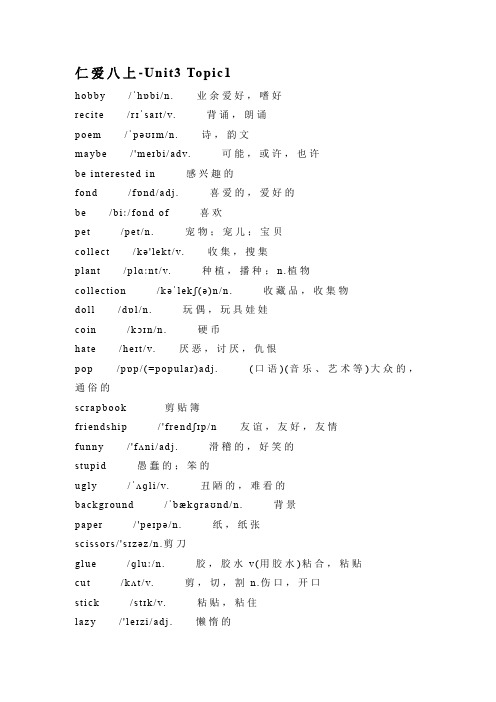
仁爱八上-Unit3 Topic1h o bb y /ˈhɒb i/n. 业余爱好,嗜好r e c i t e /rɪˈs aɪt/v. 背诵,朗诵p o em/ˈpəʊɪm/n.诗,韵文m a yb e/'m eɪbi/ad v. 可能,或许,也许b e i nt e r est e d i n 感兴趣的f o nd /fɒnd/a dj.喜爱的,爱好的b e /biː/fo nd o f 喜欢p e t/p e t/n. 宠物;宠儿;宝贝c o l l e ct/kə'l e kt/v. 收集,搜集p l ant/p lɑːnt/v. 种植,播种;n.植物c o l l e ct i on /kəˈl ekʃ(ə)n/n. 收藏品,收集物d ol l/dɒl/n. 玩偶,玩具娃娃c o i n /kɔɪn/n. 硬币h a t e /h eɪt/v. 厌恶,讨厌,仇恨p o p /pɒp/(=p opu l ar)a dj.(口语)(音乐、艺术等)大众的,通俗的s c r a pb oo k 剪贴簿f r i en ds hi p /'f re n dʃɪp/n 友谊,友好,友情f u nn y /'fʌn i/ad j.滑稽的,好笑的s t u pi d 愚蠢的;笨的u gl y /ˈʌɡl i/v. 丑陋的,难看的b ac k gr ou nd /ˈbækɡraʊn d/n. 背景p a p e r /'p eɪpə/n. 纸,纸张s c i ss o rs/'sɪzəz/n.剪刀gl u e /ɡl uː/n. 胶,胶水v(用胶水)粘合,粘贴c u t/kʌt/v. 剪,切,割n.伤口,开口s t i ck /stɪk/v. 粘贴,粘住l az y /'l eɪz i/a dj. 懒惰的t i t l e /ˈtɪʃuːˌˈtɪs j uː/n. 题目,标题p a ss a ge/ˈpæsɪdʒ/n. 章节,段落i nt ro du c t i o n /ɪnt rəˈdʌkʃ(ə)n/n. 介绍,引进e v e r yd a y /ˈe v rɪbɒdi/a dj. 日常的,每日的s n ak e /sn eɪk/n. 蛇p r ov i d e /p rə'vaɪd/v. 提供,给予o w n er /'əʊnə/n. 主人,主物c o m f o rt/ˈkʌm fət/n. 安慰,舒服v.安慰,抚慰p i g /pɪg/n. 猪,贪婪的人b a t h /bɑːθ/n. 洗澡;浴室;污秽的p o nd /pɒn d/n. 池塘d i rt y /'dɜːt i/a dj. 肮脏的,污秽的u n f ri en dl y /'ʌn'f r e n dl i/a dj. 不友好的有敌意的知识梳理【重点短语】1.in one’s free/spare time在某人空闲时间2.go fishing 钓鱼3.do some outdoor activities 做一些户外活动4.why not +v.=why don’t you + v.5.enjoy/like/love doing sth. 喜欢做某事be interested in doing 对做某事感兴趣be fond of doing sth. 喜欢做某事prefer doing sth. 更喜欢做某事6.stamp collection 邮票收集7.learn…from…从……中学习ed to do sth. 过去常常做某事be/get used to (doing sth. 习惯于做某事9.get started 着手,开始10.start/begin with…以……开始11.cut out 剪下12.stick…to…把……粘贴到……上13.share sth. with sb. 与某人分享某物14.finish school 毕业15.provide sb. with sth.= provide sth. for sb.为某人提供某物16.take/have a bath 洗澡17.whether…or not…是否18.recite poems 背诗【重点句型】1.What do you often do in your free time?你空闲时间经常做什么?2.--Why not go out and do some outdoor activities? --Sound good! Maybe I need a change.--为什么不出去做一些户外活动呢?--听起来不错,也许我需要改变。
(完整版)仁爱版八年级上册英语知识点汇总(完整版)

八年级上学期英语知识点八年级英语短语总汇Unit1 Topic11.be going to do 打算做某事2.See sb do sth看见某人做某事(全过程)See sb doing sth看见某人正在做某事(正在进行)3.cheer sb on为...加油4.Play against=fight against 与...对抗/大战5.Be against--Be for 反对—赞同6.practice+doing 练习做...7.Prefer+doing 跟喜欢...Prefer doing to doing 或比起做后者,更喜欢做前者Perfer to do, quite a lot/bit/often.Which one do you prefer, which kind of that?10. Join+某人/组织Join in+活动/比赛加入Take part in+活动/比赛Be in+活动/比赛13.Know about... 知道/了解有关于...当时间来临时,我们将采取行动;这是我们的计划。
15. It takes sb+时间/钱 to do sthSpend+时间/钱+(in) doing sth 在某方面花费多少Spend+时间/钱+on+n.物+cost+时间/钱16.There be going to be=there will be 这里将会有...17.Be good at+(doing)sth=Do well in+(doing)sth 擅长做...18.Be sure that+宾语从句确信... 19.Be sure to do 肯定要做...20.Be sure of/about 对...有把握 21.At the weekend 在周末22.Make sb/sth+adj 使...处在什么状态23.Keep+adj 保持...;keep sb/sth+adj 使...保持什么状态24.A way to 一种...的方法 25.Relax oneself 使某人自己放松26.Play for 为...效力27.Arrive in=get to=reach+大地方;Arrive at+小地方28.Excited(人);exciting(物)29.Leave for动身做某地;leave A for B 离开A地去B地Unit1 Topic21.Could you(not)....=cuold/would you please(not)do=would/do youmind(not)doing=Would you mind (not)+if+从句2.fall ill=be ill 生病其中之一是n的复数形式.优化后的文本可以是:Use 'keep doing' for continuous action and 'keep on doing' for repeated action with intervals.5.Help sb.=give sb a hand 帮助某人6.V.+间宾(人)+直宾(物)=V.+直宾+to/for+间宾7.Sure=certainly=of course 当然8.Not at all=certainly not=of course not 不介意9.Never mind=it’s nothing=it’s doesn’t matter 没关系乱扔11.Adj.修饰不定代词放其后12.Be sorry for/about.... 对...感到内疚13.What do you mean by...?=what does...mean?=what’s the meaning of...?意思是什么?14.Shout at sb. 斥责某人15.Do/try one’s best to do sth 尽某人做大的努力做某事16.Be angry with sb. For doing sth 因为某人做某事而生气17.be angry at/about sth 因某事而生气18.be angry with 因...而生气19.With the help of sb.=with one’help 在某人的帮助下20.Say...to sb. 对某人说...e into being=be born 形成/产生22.So...that... 如此...以致...=to...too... 太...而不能...23.A century=one hundred year 一个世纪24.Over=more than 超过25.Through(中间)=aross(表面) 通过阻止他们从做28.It’s + adj +(for sb.)+to do (对某人来说)做...是...29.Another+基数词又一,在一; other +n.复数另外的Around=all_over 处到处31.Just for...只是为了...32.Turn...into... 使...变成...33.Sit around 围坐在34.Get from doing 得到...35.Such as 后不可列出前面所提过的所有东西36.A number of+n.可数复数许多的;the number of+n.单数 ...的数量37.Hero 复数(Pl.) heroesUnit1 Topic31.连字符后不加soman则例外,需用复数。
仁爱版英语八年级上册单元知识点汇总第三单元
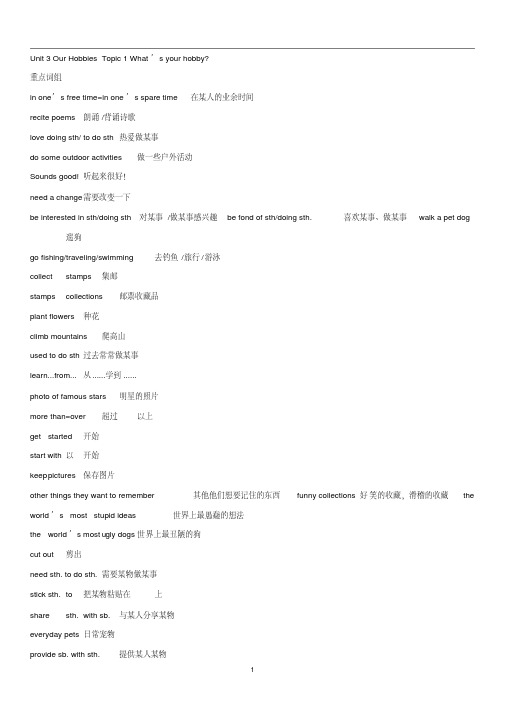
Unit 3 Our Hobbies Topic 1 What’s your hobby?重点词组in one’s free time=in one’s spare time 在某人的业余时间recite poems 朗诵/背诵诗歌love doing sth/ to do sth 热爱做某事do some outdoor activities 做一些户外活动Sounds good! 听起来很好!need a change 需要改变一下be interested in sth/doing sth 对某事/做某事感兴趣be fond of sth/doing sth. 喜欢某事、做某事walk a pet dog 遛狗go fishing/traveling/swimming 去钓鱼/旅行/游泳collect stamps 集邮stamps collections 邮票收藏品plant flowers 种花climb mountains 爬高山used to do sth 过去常常做某事learn...from... 从......学到......photo of famous stars 明星的照片more than=over 超过以上get started 开始start with 以开始keep p ictures 保存图片other things they want to remember 其他他们想要记住的东西funny collections 好笑的收藏,滑稽的收藏the world’s most stupid ideas 世界上最愚蠢的想法the world’s most ugly dogs 世界上最丑陋的狗cut out 剪出need sth. to do sth. 需要某物做某事stick sth. to 把某物粘贴在上share sth. with sb. 与某人分享某物everyday pets 日常宠物provide sb. with sth. 提供某人某物=provide sth. with sb. 为某人提供某物keep him in the house 把他养在房子里take a bath=have a bath 洗澡in the pond 在池塘中whether...or not 是否......take sb. out for a walk 带某人出去散步be special to sb. 对某人很特别keep p ets 养宠物It’s fun to do sth. 做某事有乐趣play computer games 玩电脑游戏make a scrapbook 制作一本剪贴本重点句型I’m interested in playing basketball. 我对打篮球感兴趣。
- 1、下载文档前请自行甄别文档内容的完整性,平台不提供额外的编辑、内容补充、找答案等附加服务。
- 2、"仅部分预览"的文档,不可在线预览部分如存在完整性等问题,可反馈申请退款(可完整预览的文档不适用该条件!)。
- 3、如文档侵犯您的权益,请联系客服反馈,我们会尽快为您处理(人工客服工作时间:9:00-18:30)。
仁爱版八年级英语上册Unit 3 Topic 1 知识汇总Unit 3 Topic 1 单词hobby /?h?bi/n. 业余爱好,嗜好recite /r??sa?t/v. 背诵,朗诵poem /?p???m/n. 诗,韵文maybe /'me?bi/adv. 可能,或许,也许be interested in 感兴趣的fond /f?nd/adj. 喜爱的,爱好的be /bi?/fond of 喜欢pet /pet/n. 宠物;宠儿;宝贝collect /k?'lekt/v. 收集,搜集plant /plɑ?nt/v. 种植,播种;n.植物collection /k??lek?(?)n/n. 收藏品,收集物doll /d?l/n. 玩偶,玩具娃娃coin /k??n/n. 硬币hate /he?t/v. 厌恶,讨厌,仇恨pop /p?p/(=popular)adj. (口语)(音乐、艺术等)大众的,通俗的scrapbook 剪贴簿friendship /'frend??p/n 友谊,友好,友情funny /'f?ni/adj. 滑稽的,好笑的stupid 愚蠢的;笨的ugly /??ɡli/v. 丑陋的,难看的background /?b?kɡra?nd/n. 背景paper /'pe?p?/n. 纸,纸张scissors/'s?z?z/n.剪刀glue /ɡlu?/n. 胶,胶水v(用胶水)粘合,粘贴cut /k?t/v. 剪,切,割n.伤口,开口stick /st?k/v. 粘贴,粘住lazy /'le?zi/adj. 懒惰的title /?t??u???t?sju?/n. 题目,标题passage /?p?s?d?/n. 章节,段落introduction /?ntr??d?k?(?)n/n. 介绍,引进everyday /?evr?b?di/adj. 日常的,每日的snake /sne?k/n. 蛇provide /pr?'va?d/v. 提供,给予owner /'??n?/n. 主人,主物comfort /?k?mf?t/n. 安慰,舒服v.安慰,抚慰pig /p?g/n. 猪,贪婪的人bath /bɑ?θ/n. 洗澡;浴室;污秽的pond /p?nd/n. 池塘dirty /'d??ti/adj. 肮脏的,污秽的unfriendly /'?n'frendli/adj. 不友好的有敌意的Unit 3 Topic 1 知识梳理Topic1 What’s your hobby? 【重点短语】1.in one’s free/spare time 在某人空闲时间2.go fishing 钓鱼3.do some outdoor activities 做一些户外活动4.why not +v.=why don’t you + v.5.enjoy/like/love doing sth. 喜欢做某事be interested in doing 对做某事感兴趣be fond of doing sth. 喜欢做某事prefer doing sth. 更喜欢做某事6.stamp collection 邮票收集7.learn…from…从……中学习ed to do sth. 过去常常做某事be/get used to (doing0 sth. 习惯于做某事9.get started 着手,开始10.start/begin with…以……开始11.cut out 剪下12.stick…to…把……粘贴到……上13.share sth. with sb. 与某人分享某物14.finish school 毕业15.provide sb. with sth.= provide sth. for sb.为某人提供某物16.take/have a bath 洗澡17.whether…or not…是否18.recite poems 背诗【重点句型】1.What do you often do in your free time?你空闲时间经常做什么?2.--Why not go out and do some outdoor activities? --Sound good! Maybe I need a change.--为什么不出去做一些户外活动呢?--听起来不错,也许我需要改变。
3.--What hobbies did you use to have?--I used to collect baseball cards.--你过去有什么爱好?--我过去常常收集棒球卡。
4.I am interested in playing basketball.我对打篮球感兴趣。
5.I am fond of acting.我喜欢表演。
6.I used to enjoy pop music, but now I don’t like it.我过去常常喜欢流行音乐,但是我现在不喜欢它。
7.I didn’t use to go shopping, but now I like it.我过去不喜欢购物,但我现在喜欢它。
【重点语法】used to do用法/情态动词must/whether用法1.I used to listen to rock music but now I collect telephone cards and paintings. (Page 53)我过去常听摇滚乐,可现在我集电话卡和画。
used to do sth. 这一结构表示过去的习惯(过去经常反复发生的动作)或状态(暗含的意思是现在已不复存在),只有一种形式,即过去式,用于所有人称。
used to的否定形式为:used not to do或didn’t use to do。
疑问句为Used you to... ? 或Did you use to...?如:1)I used to go to school on foot.我过去步行上学。
(暗含的意思是:我现在不再步行上学了。
)2)Mary used to sleep late.玛莉过去总是很晚才睡觉。
(暗含的意思是:玛莉现在睡觉不再那么晚了。
)3)I used to walk along the road after supper.我过去常常在晚饭后沿着这条马路散步。
4)He used not to like Peking opera, but now he’s very fond of it.他过去不喜欢京剧,但现在非常喜欢。
现在大多数人在口语中或不太正式的书面语中对否定句和疑问句常使用与do 连用的形式。
例如:1)I didn’t use to like skating, but now I like it very much.我过去不喜欢滑冰,但现在很喜欢。
2)Did you use to go there?你以往常去哪儿?3)There used to be a theater here, didn’t there?以前这里有一座剧院,是不是?be used to doing sth.与used to do sth.的区别:be used to doing sth “习惯于……,适应于……”如:1)He is used to working hard. 他习惯于努力地工作。
2)He used to bring me roses when he came to see me. 过去他来看我时,常带玫瑰花。
3)I’m used to doing jogging in the morning now. 我习惯于早上慢跑。
be used to do sth.“某物被用来做某事”。
如:1)Wood is used to make paper. 木材被用来生产纸张。
2)Computers can be used to do a lot of work now. 如今电脑可用来做许多事。
2. Collecting stamps must be great fun! (Page 53)集邮肯定很有趣!must在这里是情态动词,作用是用来表示推测,可以翻译为“想必”。
如: 1)Your brother must be in the school. I saw him just now.你的哥哥想必在学校。
我刚才看见他了。
2)Your friend must have left for Nanjing yesterday.你的朋友想必昨天已经离开去南京了。
3) She thought that her present must be in the box.她以为礼物一定是在盒子里。
4) You must be thirsty after a long walk.走了很长的路,你一定渴了。
5) It must be ten o’clock now.现在肯定有10点钟了。
情态动词must的三种否定形式:must表示“必须”时,其否定回答为don’t have to,意思为“不需要”。
如: 1)Must I pay back the money right now? No, you don’t have to.我必须现在偿还这笔钱吗?不,你不需要现在还。
2)You must listen to the teacher carefully in class.你必须在课堂上认真听讲。
must表示“推测”时,其否定形式为can’t,意思为“不可能”。
如:1)I’ve seen what she is talking about, so she can’t be telling lies.我目睹了她所说的事情,因此,她不可能在说谎。
2)Yesterday I received a letter from him, so he can’t be here.昨天我收到了他的信,所以说他不可能在这儿。
而must not的意思为“绝对不可,不许,禁止”。
如:1)You must not smoke in the hospital.你绝对不可以在医院里吸烟。
2)You must not cross the road when the traffic lights are red.交通灯是红色时,你千万不能过马路。
3.He doesn’t mind whether they’re good or not. ( Page 59)他并不介意它们是否是好的。
此句为以whether引导的宾语从句。
